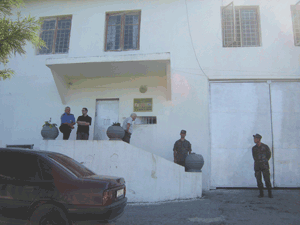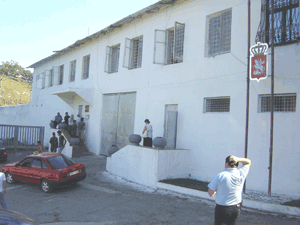 Maka Malakmadze, Batumi
Maka Malakmadze, Batumi
The Monitoring Groups existing at the prisons were deprived of their authorities. The monitoring group members can only assess the fact as the governmental interest to keep the real prison conditions in secret. Only representatives of the Public Defender’s Office and Supreme Council Members of Adjara Autonomous Republic have the right to monitor prisons. In comparison, the Supreme Council enjoys the right even less frequently.
The monitoring groups were deprived of their authority back January of 2008. Soon after the decision the groups had their monitoring authority suspended until March 1. Soon thereafter, within 24 hours group members could enter prison cells and are able to visit prisoners at any time. However, now they were monitoring the penitentiary establishments without being paid any salaries.
The groups were staffed with seven people-representatives of the NGOs and various public figures. They monitored 11 penitentiary establishments out of total 18. The Ministry of Justice granted them the authority to carry out the monitoring two years ago. The groups were set up with the initiative and support of the international NGO Penal Reform International (PRI).
Based on the recommendations of monitoring group members many activities were carried out at Batumi Prison # 3. “We did everything what we could do on the place and this resulted in some improvements in the living conditions at the prison. We also demanded window frames in the cells be widened and this to improve the flow of air and overall ventilation. Oftentimes we were acting to meditate problems between prisoners and their relatives. There were occasions when inmate could not get in touch with family and the family did not know that he was arrested or not. In cases we called the families and their attorneys,” said Geno Geladze, monitoring group member and representative of the NGO “Democracy Institute.”
many activities were carried out at Batumi Prison # 3. “We did everything what we could do on the place and this resulted in some improvements in the living conditions at the prison. We also demanded window frames in the cells be widened and this to improve the flow of air and overall ventilation. Oftentimes we were acting to meditate problems between prisoners and their relatives. There were occasions when inmate could not get in touch with family and the family did not know that he was arrested or not. In cases we called the families and their attorneys,” said Geno Geladze, monitoring group member and representative of the NGO “Democracy Institute.”
Geladze assesses the deprivation of the monitoring authority from them as serving somebody’s personal interests. “Somebody in this context means either a system or a person, as this interest does not appreciate monitoring of penitentiary establishments. If everything is all right there, then why do not they make the prisons open to monitoring groups? Having ceased our activities they exposed their will to keep the current situation in lockdowns as a secret. After members of the monitoring group left the establishments we spoke what was going in prisons. We were the initial source of information for the news media. Now we cannot report anything about the situation in penitentiary system because we have no right to enter there.”
Thea Kimeridze, spokesperson of the Ministry of Justice, stated that the monitoring program will not completely end. “The members of the monitoring groups were selected based on competition and their employment length was only for two years. This time has passed but we have not decided to announce new competition as yet. The Ministry is now discussing the policy that deals with monitoring.”
Kimeridze stated that the program will continue. “The Law on Imprisonment envisages public control in penitentiary establishments. Unfortunately, the delay means that the establishments are left without public control for some time.”
Tsira Chanturia, the Monitoring Program Coordinator of the Penal Reform International, stated: “The groups worked very effectively on arranging the problems with prison administrations. If the Ministry of Justice had adequately reacted to requests and recommendations of the monitoring groups, even more pressing problems could have been resolved.”
The program coordinator stated that prevention national mechanism should be established in September and the continued existence of monitoring groups will still be in question. The position of the Ministry is as follows: if there is national prevention mechanism, simultaneous working of commission will be unreasonable. Anyway, the matter has not been settled yet as the monitoring groups and national prevention mechanism do not interfere with each other whatsoever, and it should be just the opposite, they could work closer in coordination.”
Although the commission members have their authority verbally suspended till September they have not received corresponding documents yet. “Currently, only the monitoring group of women’s penitentiary establishment has right to work because they have received the documents.”
Currently only the Public Defender’s Office and Supreme Council of Adjara Autonomous Republic have the right to monitor prisons and other holding complexes; and the latter was vested with such rights before July 20, 2008.
Based on the information, the Human Rights Center requested from Batumi Prison # 3, three members of the Adjara Supreme Council, Petre Zambakhidze, Raul Tavartkiladze and Bezhan Gobadze visited the Batumi penitentiary department but this has been only four times since 2004.



